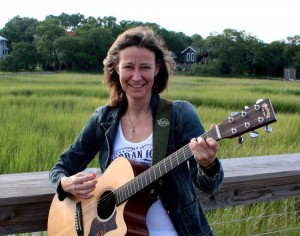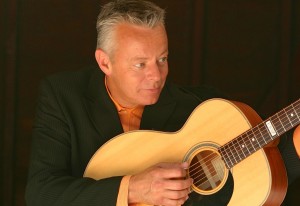ContraForce’s Experiments Reach Beyond Contra Dance
Charleston-based trio ContraForce may be deeply rooted in traditional folk music and the contra dance scene, but when it comes to composing and recording their own tunes, they certainly don’t shy away from musical experimentation.
Over the last year, fiddler Andrae Raffield, drummer/saxophonist Joey Dorwart, and guitarist Jimi “Two Nails” Periano collaborated on old standards and new originals, working in and around the Celtic and Appalachian folk styles normally featured at contra dances.
Raffield started playing violin at the age of six, training classically through middle school. In his teens, he began picking up on various folk styles, playing fiddle, guitar, and bass.
Dorwart dabbled in saxophone as a kid in Pennsylvania before moving to South Carolina when he was 10. Inspired by Primus’ Les Claypool, he began playing the electric bass as a teen and switched over to sax and drums by the time he started jamming with experimental metal and punk bands.
Raffield and Dorwart go way back with contra dance music. They performed together for years in the contra bands Anna’s Bananas and Shady Groove before enlisting Periano to form ContraForce.
The trio recorded and mixed their entirely instrumental debut album in a home studio at Dowart’s East Cooper home. According to Dowart, they recorded all of the tracks in one take with no overdubs. The final result is an eclectic, and occasionally psychedelic collection titled Rise of the Folk Organism.
Raffield and Dorwart chatted with Metronome Charleston this week:
Metronome Charleston: Did you guys play in more “conventional” rock bands before branching out into other styles, or have you all played for years with an array of styles in mind?
Andrae Raffield: I’ve played everything from classical and Celtic fiddle to rock, jazz, and bluegrass. I think that all of these influences play a part in the style of playing I bring to the group.
Joey Dorwart: There was a year or so that Jimi and I played again in a band called Archaea, doing mostly a surf-metal-lounge kind of vibe. No traditional rock bands until I ended up in the contra dance band Anna’s Bananas, where I met Andrae.
Metronome Charleston: Tell us a little bit about how and when ContraForce first came together as a trio. Were you all well acquainted as musicians and friends before the band formed?
Andrae Raffield: I was a good friend of Joey’s and had played in a contra dance band with him for some time. We both wanted to stretch the boundaries of the music within the contra dance scene and started ContraForce with this in mind. Joey had been friends with Jimi for a while, too, but I didn’t know him. Jimi came over one afternoon and we jammed and everything just clicked.
Metronome Charleston: Did ContraForce have a specific sound or mix of styles in mind from the beginning, or did the music gradually take shape in different ways as you played and composed songs together?
Andrae Raffield: We started from the foundation of the Celtic and old-time influences that most contra dance music stems from, and our intention from the beginning was to add a healthy dose of rock, psychedelic, electronic, Middle Eastern, and surf to the mix. Our sound has definitely mutated since the early stages, but we were always trying to think outside the box.
Joey Dorwart: Jimi and I just want to jam and rock the hell out, and we certainly have a rather eclectic sea of influences. I’d say we don’t play anything the same. It keeps it fresh and creative. That is the glue.
Metronome Charleston: Were you already drawn into the contra dance community before forming ContraForce? What is it about contra dance music and the atmosphere of the dances that most appeals to you?
Andrae Raffield: I was raised going to contra dances. I think it’s a lot of fun and a workout at the same time. In a culture that doesn’t always produce low pressure social situations, it’s nice to have a community as friendly and open-minded as the dance community is.
Joey Dorwart: Contra snared me when I was 17, and I haven’t found anything quite like it. It’s such a good-natured community, very welcoming to everyone. The clean physical connection with these folks is an awesome form of expression and joining. I eventually found a way to go and get paid by running sound, then I started bringing instruments like the sax and drums to the gigs. I was invited for a tune or two with most bands. It just accelerated from there. Jimi is totally new to the contra scene and is quite frankly a wildcard with music that can feel repetitive.
Metronome Charleston: Musically, how do the tracks on Rise of the Folk Organism compare with a typical ContraForce set of tunes at a contra dance?
Andrae Raffield: The music includes some songs that we play at contra dances and some that we don’t. Because the form of songs used at contra dances is so restrictive, we tend to try to spread out a little more when we don’t have to conform for the sake of the dancers.
Joey Dorwart: We work about half our original tunes into contra dance form. We often end up having two versions.
Metronome Charleston: There are familiar Celtic and Appalachian folk elements on much of the new collection, but there are some more exotic sounds pulling from klezmer and Middle Eastern styles, too. How would you describe the worldly combination of musical styles on the album?
Andrae Raffield: Jimi came from a heavy metal and surf rock background, which includes Middle Eastern sounds. I’ve played a good bit of klezmer music. I think we all had some heavy influences in that regard and love the sound of the modes and scales used in that music. Our music is definitely a mix of everything we have come in contact with and loved.
Joey Dorwart: That mix is what’s floating around inside our heads, not planned intentionally, just what we love, as Andrae said
Metronome Charleston: Did composing for and recording Rise of the Folk Organism allow the band to stretch out a bit and experiment in a way that you don’t normally get to do on stage?
Andrae Raffield: Every time we play a song it’s different because aside from the chord progressions and the overall form, it’s all improvisational. When we write, it basically consists of someone bringing an idea to the group and us jamming based on that idea for an hour or so. We definitely spread out a lot in those moments. I think if we tried to do that on stage everyone except us would probably lose interest. That being said, we get to spread out and explore on stage, but not as much as when we are writing.
Joey Dorwart: I feel what we write is a blueprint that we stretch from every time. Jimi and I aren’t trained at all, so nothing is really locked in what we do. I feel the contra form has been an amazing tool for us, since our previous improv would be lost, except in this form, it goes to a cycle and develops to a more refined degree.
Metronome Charleston: As dynamic instrumental music, the tracks on Rise of the Folk Organism have a cinematic quality to them. Have you considered hiring a filmmaker to shoot a corresponding film to accompany the music?
Andrae Raffield: I hadn’t thought about it, but that would be really cool to do. A heavy influence for everyone in the band is Ennio Morricone, and I feel like we all think cinematically while we play. I take the fact that you think our music has a cinematic quality to them as a huge compliment.
Joey Dorwart: I’d say we go meditative frequently while playing, and I’d be lying if I’d say I didn’t find imagery easy with my eyes closed and getting into the tunes.
Metronome Charleston: What’s your main artistic goal for the rest of 2013?
Andrae Raffield: We’re constantly writing new material and trying new things. We already have more than another album’s worth of material. We’ll probably start mapping out something new while continuing to gig.
Joey Dorwart: In 2013, we’re booked for a ton of contras up the East Coast, a couple of contra dance weekends, and a few pub gigs here and there. We’re refining and trying to capture the new material as we go with practices and rehearsals. Many of the new material is being worked into contra but has a grander design that we intend for the next album.
Metronome Charleston: What should someone who’s never heard ContraForce or attended a contra dance expect from you and the band at the CD release show at the Tin Roof this week?
Andrae Raffield: They should expect to have a lot of fun, zone out, possibly reach a state of higher being through sound , and hopefully feel moved to dance their asses off … in an unorganized fashion. No pressure.
ContraForce hosts a CD release show at the Tin Roof with support from Charleston-based band Clint 4 on Sat. June 29 at 9 p.m. Admission is $5. Visit the band’s Facebook page and contraforceband.wordpress.com for more.
Comments
Powered by Facebook Comments










